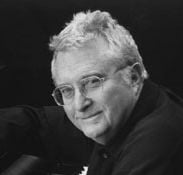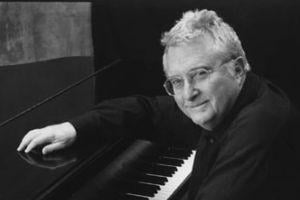
Randy Newman is an anomaly. After starting out in the singer/songwriter category that could easily turn into a career death trap, he has consistently reinvented the wheel. His first album, Randy Newman, released in 1968, bucked the folk-rock trend with completely orchestral arrangements, and included instant classics like “I Think It’s Going to Rain Today.” Apart from the melancholy love songs, frequently told through the voice of the unreliable narrators he favors, to the scabrous satire of “Redneck” and “Short People,” he has continued to defy expectations — even more so now that he is probably best known as the composer for the enormously popular Toy Stories movie series. (He recently picked up another Grammy for “We Belong Together” from Toy Story 3, and on Sunday’s Academy Awards telecast both performed the tune and won an Oscar for it.)
At the same time, Newman, who is more conscious of his place in the canon of American popular songwriting than he may like to let on, has been quietly releasing compilations of his work, including 2003’s The Randy Newman Songbook, Vol. 1 (on Nonesuch), which includes everything from “It’s Lonely at the Top” to “God’s Song (That’s Why I Love Mankind)” and “Louisiana 1927,” an account of the callous response by politicians to a hurricane that became one of the iconic responses to Katrina — and, for once, an occasion for Newman to drop his often sardonic persona.
“What has happened down here is the winds have changed,” he offers in the song, with precision and prescience. “Some people got lost in the flood/Some people got away all right.”
Volume 2 of The Randy Newman Songbook is scheduled to drop in late April or early May, and includes the neo-Freudian phantasmagoria of “Last Night I Had a Dream,” “Kingfish” (his “salute” to Huey P. Long), “My Life Is Good” (a satiric take on the life of the privileged overclass in Beverly Hills), and “Same Girl” (a novelistic treatment of a love story between two junkies).
Newman will be coming to the Bay Area soon, to appear on April 22 as part of the San Francisco Jazz Festival’s “Living Legends” series, which also includes the likes of Buddy Guy, Rickie Lee Jones, and Tony Bennett.
In a phone interview between the Grammys and the Oscars, this living legend wore his wreath lightly.
Congratulations on winning your latest Grammy. Did you attend the show?
No, I was just coming back from being on the road. I think they held the ceremony for that one in the lobby or something, to minimize the downside. But I watched about two-thirds of the show. You know, when it’s really sort of rocking along there, you remember why you like it — a lot of the musicians sounded pretty good to me.
Featured Video
Buy Tickets
Randy Newman, solo
Venue: Davies Symphony HallCity: San Francisco
Date: April 22, 2011 8:00pm
Price Range: $25-85
Mick Jagger and Bob Dylan?
Yeah [unenthusiastically]. I liked Bruno Mars and Nicki Minaj, and enjoyed seeing Lady Gaga. For the Academy Awards, I wanted Lady Gaga or Katy Perry to do some kind of inappropriate duet; I thought that Pixar would want that. I didn’t think of it as lowering my standards, but trying to get two people that people actually liked.
Keeping things topical, when you wrote “Korean Parents” [a tongue-in-cheek take on Asian-American child-rearing on 2010’s Harps and Angels], did you have any idea that “The Battle Hymn of the Tiger Mother.” phenomenon would be coming?
No. But my kids had a number of Korean friends, and some Taiwanese, and they just appeared to have it together, excelling at school compared to their classmates. I know that kind of stereotype is dangerous, but I’m always interested in the idea of going too far with it. It made me laugh to think about it. ... The violins, and the idea that getting one will cure everything for you.
Did you get negative feedback from the Asian-American community?
No, just from my children. It’s a delicate area. Some people are offended by it. And my children don’t want me to play that song in L.A. I don’t play it that much live for other reasons; it kind of needs a band.
But you didn’t get as much static about it as you did from “Rednecks” or “Short People?”
No, if it were a big hit, maybe that would’ve happened.
I’m waiting for you to do the soundtrack for the film adaptation of “Battle Hymn”
No, that’s it. That’s all I have to say on the subject [laughs]. ... I don’t know whether people have the stomach or the guts as a parent to put in those kind of Tiger Mother precepts, and make their kids check their homework three times. My kids might be better off if I’d done that, but I think I wanted them to like me or something. It’s hard enough even to talk to them, let alone tell them to check their work three times.
You come from a musical family, with two uncles who were film composers, and your first album was fully orchestral. Why did you go that route?
I just wanted to see if I could set the songs, put them in a place where you could see them, ideally. Little things like not using a piano on “Cowboy,” because it’s about the outdoors. It sounds silly to me now, with the way things have gone in technology and movies, but pianos still take me indoors somehow.
Given your background, was it mandatory for you to get musical training when you were a kid?
Oh, yes. I was 6 or 7 when I started playing. I think my father wanted to be a musician. He played clarinet a bit, and saxophone, but his brothers were musicians. He thought that was the greatest art form in the world, you know, and I think he wanted me to be one, too.
Was it a chore to take piano lessons, or something you relished?
The truth is I didn’t relish it. I didn’t like the lessons so much. In some ways, I’m amazed that I’ve got where I am. There was something else I had, and it’s hard to say what it was. It certainly isn’t piano technique. I didn’t acquire it, although I might have if I’d worked a little harder [laughs]. I’m trying not to say more than 10 negative things about myself in a row, but sometimes it just pops out. I’m trying to watch it.
Did you keep up with your studies?
Yes, I studied privately with Mario Castelnuovo-Tedesco when I was 16 or 17, maybe a little younger, and then I studied theory, and took a class with the composer Roy Harris at UCLA, and learned a lot with him, too. I’ve taken lessons since then, occasionally, and appreciated it more, too.
Who are the pianists you most admire?
There are so many phenomenal classical pianists. I listen a lot to Artur Schnabel’s Beethoven Sonatas from the ’30s and ’40s, which are just amazing. As far as rock and roll, there’s a guy named Bobby Charles from New Orleans, who died recently who I loved. I started writing songs when I was 16, and Leon Russell had just come out from Oklahoma and would play on the demos of the songs I wrote. David Gates, too, the guy from Bread; this was before he wrote “This Diamond Ring,” for Gary Lewis and the Playboys. Glenn Campbell played guitar on some of the demos, too.
P.J. Proby and Jackie DeShannon play in some of those sessions, and Jimmy Gordon. It was a good band, but I was too intimidated to play piano myself when Leon was there. It’s scary to run into someone who plays that well right when you walk in the door. And Elton John is another tremendous rock performer.
"It’s Lonely at the Top” has that quiet jazzy piano intro before you get into the lyric.
Yeah, it’s sort of a German, Kurt Weill kind of thing. I’ve been influenced by that, and a tremendous amount by blues-oriented guys like Ramsey Lewis and Oscar Peterson. It’s funny, I hadn’t heard George Shearing’s name in a long time, but when he died, the music sort of comes back to you. I remember he said he liked bebop but he wasn’t interested in doing it. He was trying to make a more beautiful kind of sound, but it didn’t sound as good to me as it did back in the day. It seems blander, like jazz without any edge to it. Maybe it’s just what they’ve been playing.
You originally wrote “It’s Lonely at the Top” for Sinatra.
Yeah, I played it for him.
What did he say about it?
Nothing. He just told me he liked “I Think It’s Going to Rain Today.” I played it for Streisand too, but she thought people would believe that she meant it, and that she was just whining.
Dylan, who rarely gives compliments, has said you’re one of the best songwriters around. Then he went on to say he likes your early songs the best.
That’s what I say about him! His early stuff is as good, lyrically, as the form ever got. I don’t know the last five albums particularly well, but after Nashville Skyline I was less interested. Who knows? I don’t know if I can do what I did before, either.
You’ve also said that there’s an implicit competition between folks like Dylan or Paul Simon about claiming the highest ground.
I know Paul felt that way; I don’t know if he still does. I’d hear the Beatles and people would rave about that, correctly. I was inspired to be the best in the world. But you never get there, really. There’s always somebody else coming around.

